|
Here's where I post my circuits for my pedals, and now on-board circuits, effects, and other stuff I create myself. Most of this stuff is done off-the-cuff by experimenting with breadboards. I'm self-taught when it comes to electronics, and it's an outgrowth of my guitar repair skillset.
In 2017, I joined a 90's cover band called "The Sweaty Vedders" and while in the band, I needed a fuzz pedal to get a more "Black Francis/Soundgarden/Bush" type muddy fuzztone as my Marshally voiced amplifier sounded just a little too "tight" "precise" and "pristine" and "80's" for some of the sounds I wanted to get. So I shopped for Fuzz Pedals commercial and booteekey and well...they all cost way too much, so I looked at how to make one and found a 7 minute Fuzz tutorial on YouTube from an Austrailian dude, and started there. Six months, and $90 in parts I'm STILL using up all these years later, I left with the beast that is the FazzFuzz - which really is my "dream" Fuzz Pedal TBH. And aside from some deviation from the "BazzFuss" Pedal (actually five with alterations chanined in a row human centipede style and each "Segment" named after the Animatronics from Five Nights at Freddy's - hence the name "FazzFuzz") - everything else was just trial and error. In the end, I made an original effect, with only experience from guitar wiring to draw on, and schematics found via Google Search. Since then, I've been indulging in making MORE of these kinds of electronic "abominations" or "logic-defying creations" in my mad lab, including the Samsquanch, 2 guitar synths, a Reverb, and another Fuzz (SkullFuzz), and may have another distortion pedal on the horizon as well - AND even a guitar with a built-in hexaphonic synth. Who knows, Maybe I'll make some copies and put em' on Reverb someday for the world to enjoy. I really like my crazy stuff, maybe someone else will.
DISCLAIMER: I am in no ways a trained, skilled, or otherwise, educated electronics technician. I'm a skilled tinkerer at best. Somehow, I manage to make circuits that work and sound good like it's a third nature thing. So to the skilled pros, no, this isn't a pro-level pedal page, this is the works of a madman with omponents, breadboards, and oddness.
Tutorials (with what limited knowledge I have yet)
So I'm going to write how I actually DO all this stuff, maybe inspire more people to get into making these things. What I lack in experience I make up for in creativity and deductive reasoning. Consider this a "for Dummies Book" written BY a "dummy" (though I'm really no dummy).
0.) - Basic Electronic Stuff, Tools, & Components
1.) - Basic Fuzz Stuff, Your First Pedal
2.) - Basic Reverb Stuff, Behold the Beltron Brick!
3.) - Basic CMOS Lunacy, CMOS Fuzzes & Primitive Synth
My Pedal Design/Builds
Here's where I share my crazy *wonderful* creations of sonic destruction/construction designed to fit my own personal musical style and use-cases. Who knows, I might gear up and produce some limited quantities of these someday. Either way, I've got a lot on my plate and I'm working through them in small amounts. Some of these the breadboards got knocked around by my two moody cats, so I just start over and apply my new experiences - and boom - I have something that does something closer to my intended creation. I've got a lot to learn, but I'm learning a lot really fast. I mean, c'mon, how many guys DO YOU know who have basically taken random internet schematics and made their own pedal from scratch on down to etching their own circuit board for it.
PEDAL
NAME + PICTURE
|
TYPE
|
SHORT
DESCRIPTION
|
"Fazz
Fuzz"
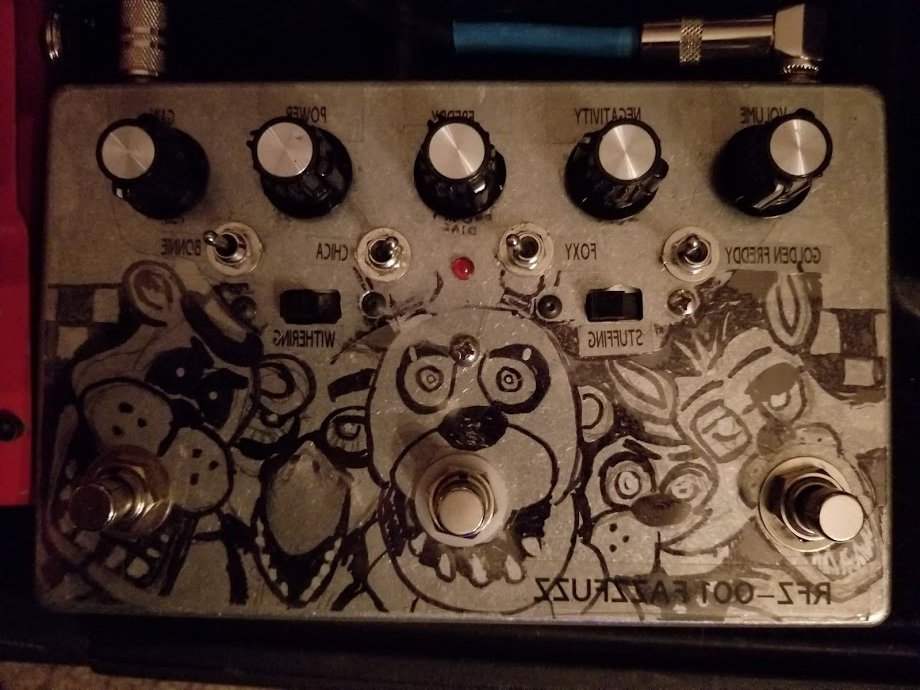
|
Fuzz |
2017
- This is the first pedal I designed and built. It's
basically 5 BazzFuss circuits wired together with some
alterations, variable biasing for the input stage, and a
ganged-bias for all subsequencent stages. I used it in that
incarnation in the Sweatty Vedders for quite some time for my main
fuzz. It's very loud and powerful, it's unbuffered, and it
has some quite useful glitch settings.
My idea was to build something like my ultimate version of a Fuzz
Factory - basically, even the glitchy settings are useful because
of the fact there are both permanant and momentary switch modes on
it. I'd say I succeeded at it. It makes a great, tight,
controlled fuzz, a good treble boost, amazing Atari-like glitch
noises, and even a full blown square wave synth if you slam the
front end of the pedal with something else.
In 2020 it was discovered it could do Synthesizer Effects by
slamming the input with a Behringer EQ, so I built a simple,
over-powered LM386 Op-Amp into it, removing the treble bypass
switch entirely, and instead wiring in the LM386 into that switch,
allowing for it to get some pretty darn good monophonic square
wave synth tones out of a guitar without much work. |
"Skull
Fuzz"
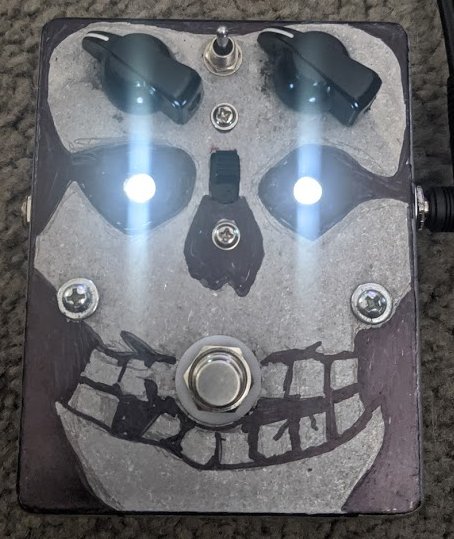
|
Fuzz |
2019
- Simple Tagboard pieced-together Fuzz based on the BC547 Silicon
Transistor. Runs best at around 5vdc, but has variable
voltage ranging from a highly gated fuzz at 9vdc, to a super
fuzzy, almost Rat or Big Muff sort of thing at 3vdc.
It started life as some kind of extremely mild treble boost or
some kind of weak Dallas Arbiter Fuzz Face design. I wanted
a wall of mud for doing Misfits covers - so I created an NPN
BazzFuzz type circuit, but changed the way I wired a few things so
that it would handle a little differently. I experimented with
voltages and found 3-5vdc worked best, so I put in a switch with 2
1M resistors to cut the voltage flow so you could have a choppy,
muddy, thick fuzz all the way down to a muddy sludgefest, and that
could be tamed by the bass-cut switch where the nose is.
Two indiscator LED's were put in for eyes - cannibalized from a
children's LED Lamp Builder set I bought at a garage sale.
This has got to be my favorite fuzz pedal of all time. It
can be tight and controlled, or very muddy and thick - think Gish
era Smashing Pumpkins or Bleach Era Nirvana - that's what this
thing does and does well. It also does the Ric Ocasek/Cars
thing (ala Good Times Roll, or Got A Lot on My Head's rhythm
track) extremely well. |
"Dungeonverb"
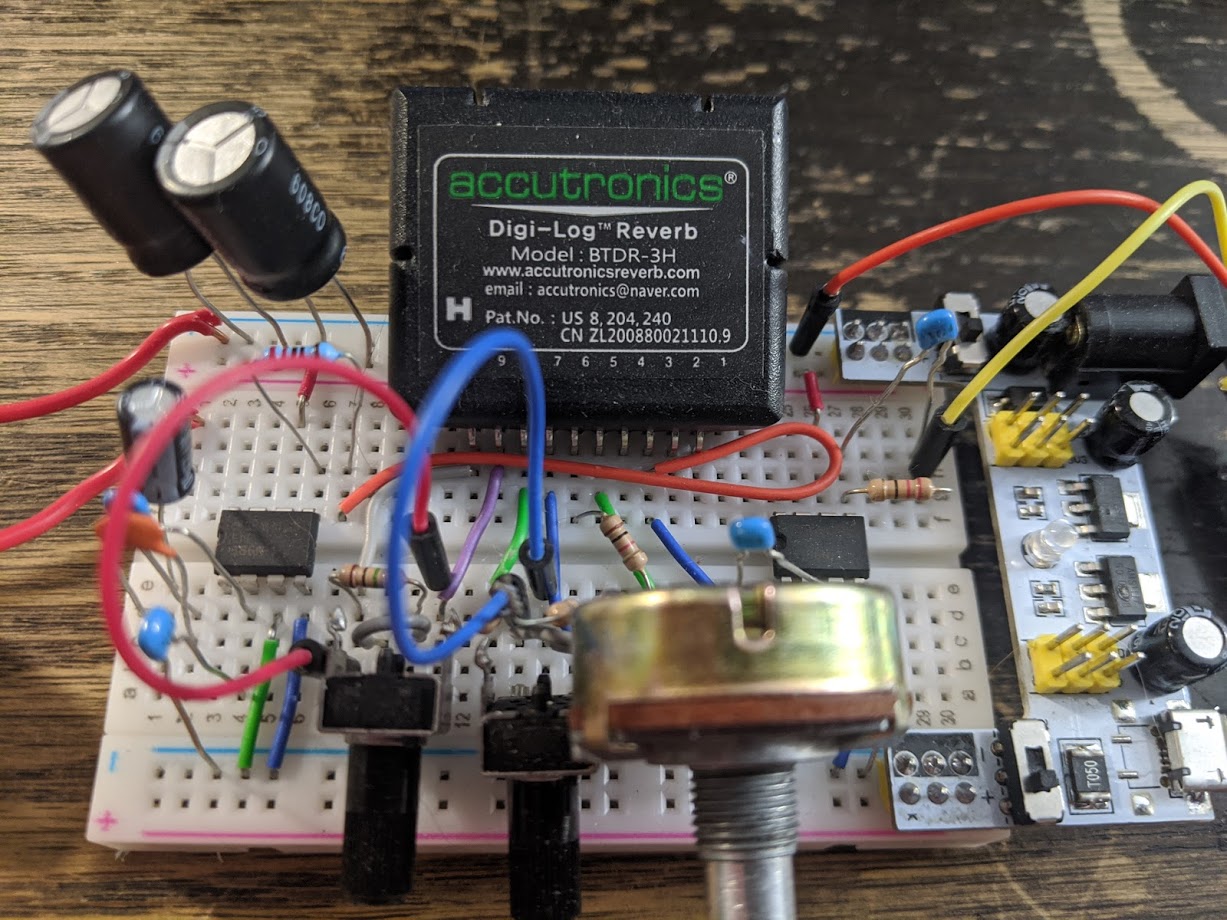
|
Reverb |
2019
- I bought a Belton BTDR-3 Brick and experimented and came up with
my own Reverb pedal entirely just by looking at the basic
schematic and then using notes from it to tailor it to MY
sound. Eventually I have a goal to make a pedal capable of
those Lithium/Crystal-like ethereal washes and this is 1/2 of what
that circuit will be when I get around to that design.
What this pedal does is uses the dual reverbs as a far/near
effect, and then allows some minor cross-talk between the two to
get a very insane-long reverb trails and a big-thick, almost
canyon like reverb. I plan to install it into my amp at some
point too to replace the original Behringer Reverb Circuit
possibly. |
"Samsquanch"
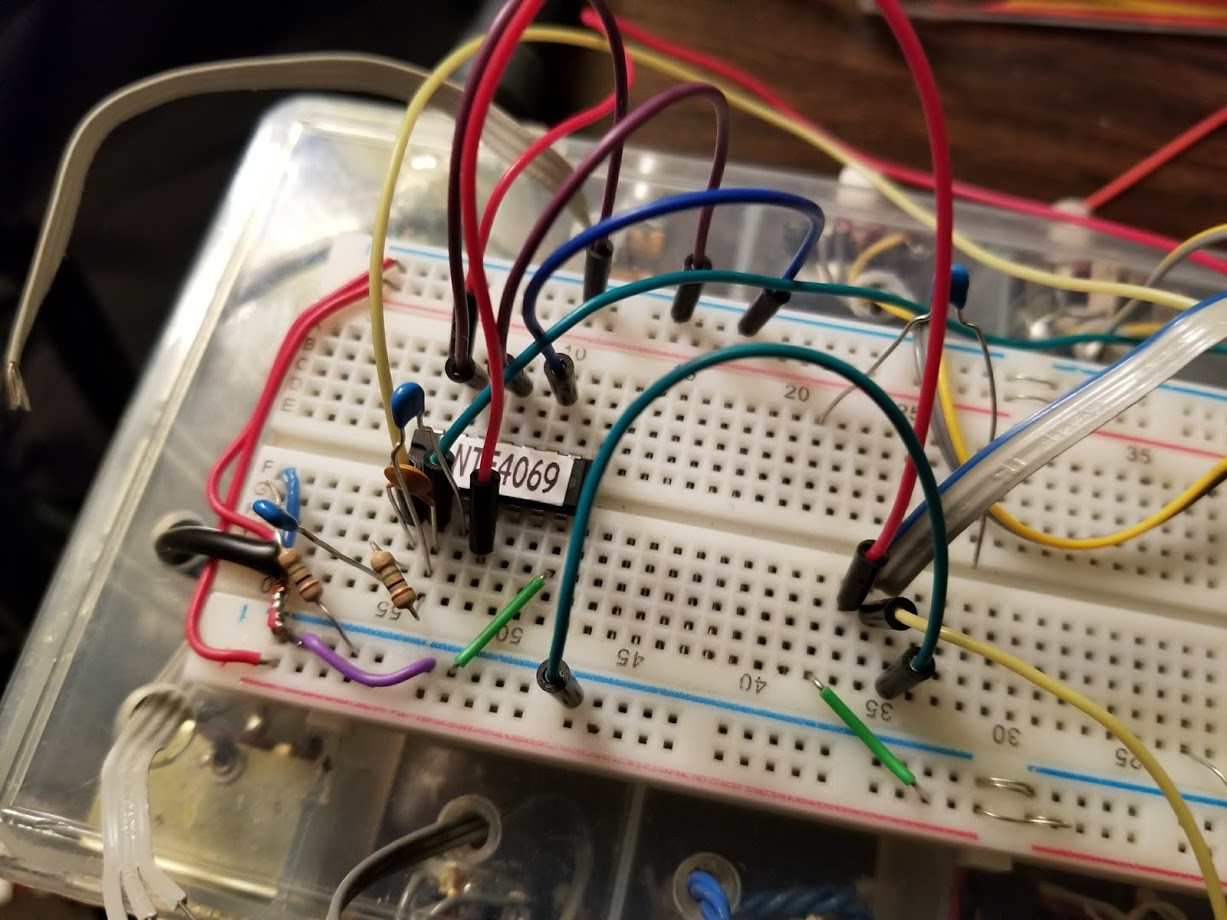
|
Distortion |
2018
- CD4069 CMOS based Distortion Pedal with multiple levels ranging
from a Joe-Walsh like overdrive, to a Paul Dean type heavy
distortion, to metal madness - all the way to full blown
Synthesizer noises. It can even be run without power to add a
tube-amp element to a transistor amp that sounds a little flat.
I came up with this one right after the FazzFuzz and was shocked
when I suddenly had "Paul Dean in a Pedal" on my desk. I
found if I backed it down, I got something more like old
Eagles/James Gang Joe Walsh, nice! Ramping it up put me more in
Cookie Monster Death Metal territory, until it just flattens out
into a Square Wave like something DEVO would do. NICE.
That's like, five bands in one pedal. I'm still
experimenting with this circuit. It's going to be awesome. |
"Guitari
2600"
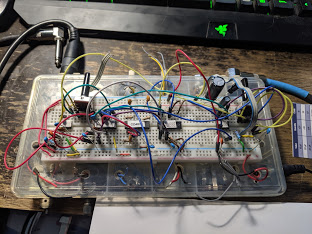
|
MonoSynth |
2018
- This is a CMOS based monophonic guitar synth pedal with octave
up and down, but blended in a way you get some pretty sick
power-bass sounds and cool high level synth tones. It really
does sound a lot like an Atari game console from 1977. It
also plays well with pitch shifters, choruses, and reverbs. This
likely is the next one to get a proper PCB and a case.
I'm not going to reveal much on how it works because it uses some
unique methods and breaks a few electronics rules to achieve it's
sound. I also need to work out a voltage regulator for it.
It seems to run best at a perfect 9-12VDC, and I have a feeling if
I boost voltages to certain parts of the circuit, I might end up
being able to get certain effects to do even more. |
Experiments in Sustainers
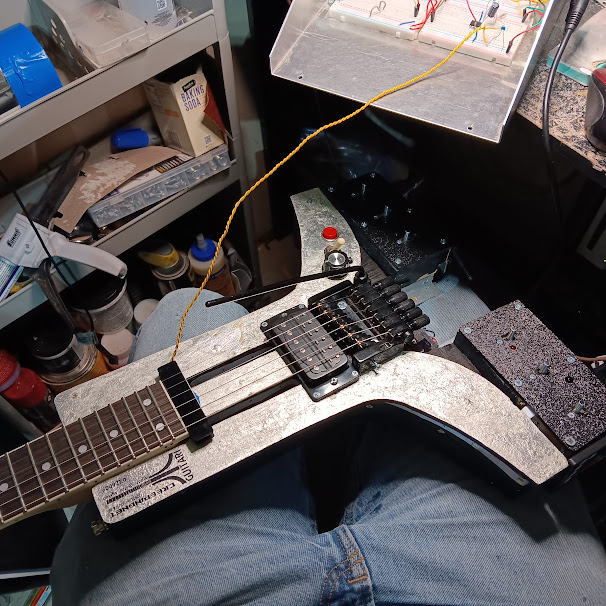
|
Sustainer |
2023 - I started developing my own drivers and experimenting with different Op-Amps to design my own Sustainer circuit after buying 2 of the cheapest units you can buy online from Indonesia: iSUSTAINER TB-60, and the VEYZ Sustainer. It's not out of dissatisfaction of those products, but rather, me wanting to learn more about how they work and see if I can pull it off. So far, I've had several working prototypes using my own drivers and a bread-board feeding off the guitar's output jack using several different coils. This is the new page to outline those experiments and what I have done. I know there are others working on this who are aspiriing to a professional product, I'm just working on a simple design of my own. The first prototype is going in the ATARICaster guitar I built.
|
ATARICASTER Fuzzstortion Preamp
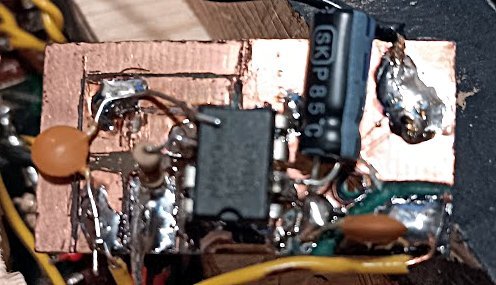
|
Preamp/Overdrive |
2024 - a little rinky-dink LM386 based distortion/fuzz that I built for a couple of purposes.
For staters, if you're building a guitar that's going to have an on-board synthesizer wired inline with the pickups, you might need to use a on-board distortion to allow the synth to bypass it while playing on the clean channel. Secondly, the AtariCaster has a stacked humbucker bridge pickup around 10K that sounds very twangy like a Single Coil, so sometimes, playing solos or rhythm parts, I need a boost in the low and low mids for more growl, this gives me that. Lastly, it's just cool
|
Hexaphonic Pickup Hijinks
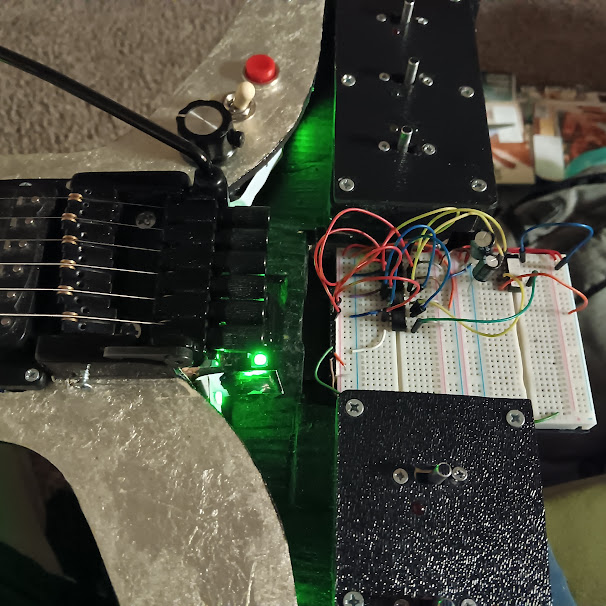
|
Stereo Guitar & Synth |
2024 - Anotehr outgrowth of the ATARICaster project, was a custom interface for running a on-board, cartridge-interchangable audio modules that could be mixed with the regular pickup. All of these are designed using the First Act "Rise of the Six String" XBOX 360 guitar controller's old pickup from around 2008. Basically, it allows me to feed each string in individually, and then do whatever processing I want whether that's converting it pitch to voltage for a VCO, or just boosting them with an op-amp, and then panning them somewhere on the stereo spectrum for separate output as a stereo guitar.
|
|

